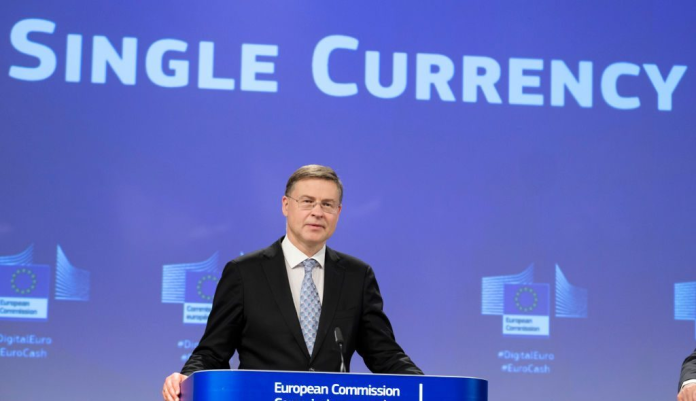European Commissioner for Economy Valdis Dombrovskis stated that Bulgaria’s goal of adopting the euro in 2026 remains achievable, though further efforts are needed, according to Euractiv.
Speaking ahead of the Eurogroup meeting, Dombrovskis highlighted that eurozone finance ministers are awaiting a progress report from Bulgarian Finance Minister Temenuzhka Petkova on the country’s preparations for euro adoption.
Bulgaria’s primary hurdle is its inflation rate, which stood at 2.6% in January—slightly above the Maastricht criterion threshold by just 0.03%. While this marginal excess does not disqualify Bulgaria, it underscores the need for careful economic management to meet the eurozone’s strict convergence criteria.
Political pressure on central bank
The Bulgarian National Bank (BNB) faced increased scrutiny and pressure, particularly from the Vazrazhdane party. On Monday, activists from Vazrazhdane, the fourth-largest party in Bulgaria’s parliament, stormed the BNB building, accusing the central bank and the International Monetary Fund (IMF) of preparing to “falsify” economic data to facilitate Bulgaria’s eurozone accession.
However, the BNB condemned the incident, calling on parliament and other institutions to protect its independence from political interference.
We call on the parliament and other competent institutions to support with all the rigor of the law the right of the BNB and other independent institutions to exercise their statutory mandate without political pressure.
Vazrazhdane has yet to provide evidence to support its claims of data manipulation. The party’s actions have drawn criticism from other political leaders, including Delyan Peevski, head of the DPS – New Beginning party, who warned of consequences if state institutions fail to protect the central bank.
Bulgaria’s bid to join the eurozone by January 1, 2026, is seen by pro-European parties as a crucial step toward deeper integration with the EU. However, the process has faced resistance from factions like Vazrazhdane, which oppose closer ties with the West.
Peevski, a controversial figure sanctioned by the US and UK, has emerged as a vocal advocate for Bulgaria’s eurozone accession and military support for Ukraine. At the same time, he has called for an investigation into the influence of George Soros’ activities in Bulgaria, reflecting the complex political landscape in the country.
Looking ahead
Despite the political tensions, Dombrovskis’ remarks signal that Bulgaria’s eurozone aspirations remain on track, provided the country can address its inflation challenges and maintain economic stability. The coming months will be critical as Bulgaria works to meet the eurozone’s criteria and navigate domestic political opposition to its EU integration efforts.
The Bulgarian government’s ability to uphold the independence of its institutions, such as the BNB, will also play a key role in ensuring a smooth transition to the euro. As the 2026 target date approaches, the stakes remain high for Bulgaria’s economic and geopolitical future.
